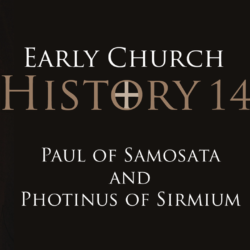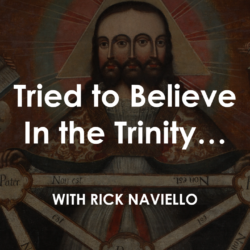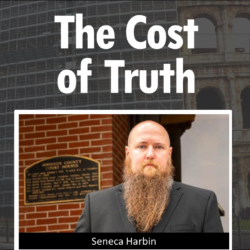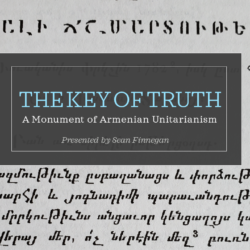Although sometimes lumped in with enlightenment rationalism, the biblical unitarian movement came to prominence right from the start of the Reformation. Essentially, as soon as bible translations started getting into the hands of regular people, a great many Catholic doctrines came under scrutiny. In this episode you’ll learn about three major biblical unitarian trailblazers of the sixteenth century, including Claude of Savoy, Adam Pastor, and Michael Servetus. These men did not give definitive shape to the larger groups that soon emerged, but they tread along the path, preparing the way for those who would come after.
This is lecture 5 of a history of Christianity class called Five Hundred: From Martin Luther to Joel Osteen.
All the notes are available here as a pdf.
—— Notes ——
Claude of Savoy (Claudius Aliodus) (1500?-1560?)
- Itinerant preacher
- 1534 – exiled from Basel and Bern
- 1534 – Henry Bullinger (1504-1575), Zwingli’s successor in Zurich, wrote a defense of the dual natures’ doctrine to refute Claude’s teachings.
- Claude’s confession of faith:
“’The Lord thy God is one.’ Whence then are there two others? particularly since it is written [Rom. 11:34]: “Who hath been his counselor?” That man alone, whom Mary conceived and brought forth, is called Jesus, which is proved [by Luke 1:31 -32]: “Behold thou wilt conceive and bring forth a son and thou shalt call his name Jesus; and he will be called great and the Son of the Most High.” Who therefore is so holy, so great, who is called the Son of God, but he who was conceived in the womb of the Virgin and born?
Therefore a Christian should acknowledge none other to be the Son of God than him whom Scripture so declares. Behold, the same man, the first born of Mary, is called the Savior and not some divinity of Christ. He is declared to have saved us by his blood, not by his divinity. For this reason he himself says of himself [John 6:54]: “who eats my flesh and drinks my blood has eternal life.” He does not say. “who eats my deity.” Therefore I am not held to eat the deity of Christ but rather his flesh and to drink his blood.
They blaspheme therefore who say of the Virgin that she is the Mother of God, for she did not bear God but Christ. If heaven and earth cannot contain God, how much the less the womb of a woman? In any case, if Jesus were thus divided into God and Man, the Virgin would not be the Mother of Christ, but only of a part of him.
Observe also the expression “this day” [I have begotten thee: Ps. 2:7; Acts 13:33; Heb. 1:5; 5:5], which indicates a definite time. He was not, therefore, begotten eternally of the Father, as they [the orthodox] falsely imagine. But when came the fullness of time he sent his Son made of woman. Therefore he is precisely called the Son of God, who is made of woman.
The Father gives testimony concerning him [cf. Matt. 3:17]: “This is my Son with whom I am well pleased.” Concerning whom is this said, unless it be about him who had been baptized? For surely the divinity of Christ is not said to have been baptized, but only the man was shown forth. Again [John 1:29]: “Behold the Lamb who taketh away the sins of the world.” In that he is said to be a Lamb, nothing of deity is included, but exactly what is appropriate for sacrifice. It is also sufficiently shown, by the declaration [Heb. 2:16]: “he took not on him (assumpsit) the nature of angels, but he took on the seed of Abraham” that the Father, wishing to reconcile the world to himself, willed to do this by a creature and by blood, and not by any divinity. But the Father was in him through the plenitude of the Spirit reconciling himself to the world. It is not said that he assumed some divinity of the Son, which had existed from eternity, but only the seed of Abraham.
I confess, however, that Jesus Christ is God in that manner in which he himself said that he was. If he [in John 10:35] called those gods, to whom the Word of God came, how much more is he God, whom the Father sanctified, who received the Holy Spirit above his fellows [Heb. 1:9], so that all might receive it through him from the Father.
I believe in God, the Father Almighty, the Creator of heaven and earth, and that he alone was from eternity; and in Jesus Christ, his only Son, our Lord, who was conceived of the Holy Spirit and born of a Virgin, and at a given time, but therefore precisely not from eternity. Therefore I believe also in the Spirit, but not in God the Holy Spirit. In short, I do not believe that three persons are one God, but I know that they are three men (homines). Three persons are three men, and not one God. [1]
- 1535 – stayed a month in Wittenberg trying to convert Luther
- 1536-39 – served as preacher in Thonon (on Lake Geneva)
- 1550 – preached in Memmingen, making many converts though impoverished and limping
Adam Pastor (1510-1560?)
- Had been a priest prior to his conversion
- 1533 – joined Anabaptists
- Beliefs
- Christ did not exist as the Son of God before coming into the world
- Christ was divine only in the sense that God dwelt in him
- Christ was only human though he bore God’s word
- 1543/5 – ordained as elder by Simons
- Actively preached at Düsseldorf
- 1547 – excommunicated by Dirk Philips (Simons concurred)
- 1552 – met at Lübeck with Simons to discuss deity of Christ
- 1552 – published Unterscheit tusschen rechte unde valsche leer (Difference between correct and false doctrine)
- Pastor’s ideas may have made it up to Krakow in Poland
Michael Servetus (1511-1553)
- Born in Aragon, Spain
- 1528-1529 – went to University of Toulouse to study law
- 1529 – went with his patron John of Quintana to the coronation of the emperor Charles V at Bologna as an aide
Servetus wrote, “As concerning Christ it is said, ‘On their hands they will bear thee up, lest thou strike thy foot against a stone,’ so the Pope for this reason has himself carried by others. He does not touch the ground with his feet, lest his holiness be polluted—to be carried on the shoulders of men and thus to make himself to be adorned on earth as God, which no one so impious has dared to be from the foundations of the world. With these very eyes we have seen him borne in pomp on the necks of princes making with his hand the sign of the cross and adored in the open streets by all the people on bended knee; so that those who were able to kiss his feet or slippers counted themselves more fortunate than the rest, and declared that they had obtained many indulgences, and that on his account the infernal pains would be remitted for many years. O vilest of all beasts, most brazen of harlots!”[2]
- On the Errors of the Trinity (June 1531 printed by John Setzer in Hagenau, outside Strassbourg)
- Town council of Strassbourg ordered Servetus to leave or be punished
- 1532 – this hostility inspired Servetus to write Dialogues on the Trinity
- By age 20, he was hunted in Spain, banished from Strasbourg and Basel, and severely criticized in Wittenberg
“When I began, such was the blindness of the world that I was sought up and down to be snatched to my death. Terrified on this account and fleeing into exile, for many years I lurked among strangers in sore grief of mind. Knowing that I was young, powerless and without polish of style, I almost gave up the whole cause, for I was not yet sufficiently trained…O most clement Jesus, I invoke thee again as divine witness that on this account I delayed and also because of the imminent persecution, so that with Jonah I longed rather to flee to the sea or to one of the New Isles.”[3]
- 1536 – went to University of Paris to study medicine
- 1542 – published one-volume edition of the Bible
- 1545 – published seven-volume Pagnini Bible
“He enjoyed a tranquil and respected life, engaging in covert theological speculation and writing, but outwardly conforming to the Roman Church. He would later justify his Nicodemism by appealing to the willingness of Paul himself to conform to outward Jewish practices in the Temple when in Jerusalem (Acts 21:26).”[4]
- 1546 – sent Calvin a draft of his unfinished book, Restitution of Christianity
Calvin wrote Farel, “Servetus has just sent me, together with his letters, a long volume of his ravings. If I consent, he will come here, but I will not give my word; for, should he come, if my authority is of any avail, I will not suffer him to get out alive.”[5]
- 1553 – published Restitution of Christianity
- Arrested by Inquisition in France, but escaped on April 7, 1553
- Arrested by Protestants in Geneva
- Trial: accused subverting social order, leading a dissolute life, affinity with Jews and Turks
- October 26, 1553: court found Servetus guilty of Antitrinitarianism and Anabaptism and sentenced to be burned at the stake
- October 27, 1553: executed outside city walls
- Last words, “O Jesus, Son of the eternal God, have mercy on me!”
- Still would not say, “O Jesus, eternal Son of God, have mercy on me!”
[1] George Williams, The Radical Reformation (Kirksville, MO: 2000 Truman University Press), pp. 470-2.
[2] Williams, 55-6.
[3] Williams, 403.
[4] Williams 926.
[5] Williams 927.
—— Links ——
- Books in this episode
- Out of the Flames by Laurence & Nancy Goldstone
- The Protesters by Alan Eyre
- Socinianism in Poland by Stanislas Kot (trans. Earl Morse Wilbur)
- A History of Unitarianism by Earl Morse Wilbur
- See all the episodes of Five Hundred: From Martin Luther to Joel Osteen.
- The three main textbooks for this class include:
- The European Reformations by Carter Lindberg
- The Radical Reformation by George Williams
- Modern Church History by Tim Grass
- Check out these other Restitutio historical podcasts
- Intro music: “District Four” by Kevin MacLeod. Licensed under Creative Commons: By Attribution 3.0 License.







Sean – thank you for this. It will be on my face book wall today !